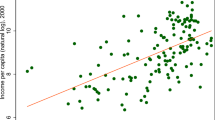Abstract
This paper examines a developing economy using a family-optimization model in which the number of children is a normal good. Trade liberalization generates two effects: the income effect that increases population growth and the gender wage effect that, in the short run, increases, but, in the long run, decreases population growth. With higher income, families invest more in capital if the status of the capital is significant. Because female labor is complementary to capital, higher investment increases the relative wages of women and attracts them from child rearing into production. Ultimately, the population growth falls below the original level.
Similar content being viewed by others
References
Azariadis C, Drazen A (1990) Demographic transition in a dual economy. Mimeo, University of Pensylvania
Becker GS (1960) An economic analysis of fertility. In: Coale AJ (ed) Demographic and economic change in developed countries. Princeton University Press, Princeton, pp 209–240
Becker GS (1991) A treatise on the family, enlarged edition. Harvard University Press, Cambridge
Becker GS, Barro RJ (1988) A reformulation of the economic theory of fertility. Q J Econ 103(1):1–25
Becker GS, Murphy KM, Tamura R (1990) Human capital, fertility, and economic growth. J Polit Econ 98:S12–S37
Berik G (2000) Mature export-led growth and gender wage inequality in Taiwan. Fem Econ 6(3):1–26
Chang W, Hsieh Y, Lai C (2000) Social status, inflation, and endogenous growth in a cash-in-advance economy. Eur J Polit Econ 16(3):535–545
Cigno A (1998) Fertility decisions when infant survival is endogenous. J Popul Econ 11:21–28
Collier P, Gunning JW (1999) Explaining African economic performance. J Econ Lit 37(1):64–111
Corneo C, Jeanne O (1997) On relative wealth effects and the optimality of growth. Econ Lett 54(1):87–92
Corneo C, Jeanne O (2001) On relative-wealth effects and long-run growth. Res Econ 55(4):349–358
Easterly W, Levine R (1997) Africa’s growth tragedy: policies and ethnic division. Q J Econ 112(4):1203–1250
Fisher WH (2005) Current account dynamics in a small open-economy model of status seeking. Rev Int Econ 13(2):262–282
Fisher WH, Hof FX (2005) Status seeking in a small open economy. J Macroecon 27(2):209–232
Galor O (2005) From stagnation to growth: unified growth theory. In: Aghion P, Durlauf S (eds) Handbook of economic growth, vol 1A. Elsevier, Amsterdam, pp 171–293
Galor O, Mountford A (2006) Trade and the great divergence: the family connection. Am Econ Rev 96(2):299–303
Galor O, Weil DN (1996) Gender gap, fertility, and growth. Am Econ Rev 86:374–387
Galor O, Weil DN (1999) From Malthusian stagnation to modern growth. Am Econ Rev 89(2):150–154
Galor O, Weil DN (2000) Population, technology, and growth: from Malthusian stagnation to the demographic transition and beyond. Am Econ Rev 90(4):806–826
Ghiara R (1999) Impact of trade liberalization on female wages in Mexico: an econometric analysis. Dev Policy Rev 17(2):171–190
Haaparanta P (2004) International trade, resource curse and demographic transition. HECER discussion paper no. 11. University of Helsinki, Helsinki
Heston A, Summers R, Aten B (2002) Penn world table version 6.1, Center for International Comparisons at the University of Pensylvania (CICUP), USA
Kurz M (1968) Optimal economic growth and wealth effects. Int Econ Rev 9(3):348–357
Lehmijoki U (2003) Demographic transition and economic growth. University of Helsinki, Helsinki
Lucas RE Jr (2002) Lectures on economic growth. Harvard University Press, Cambridge
Maddison A (2001) The world economy, a millenial perspective, Development Centre Studies. OECD, Paris
Maddison A (2003) The world economy, historical statistic, CD-ROM. OECD, Paris
Mincer J (1963) Market prices, opportunity costs, and income effects. In: Christ CF (ed) Measurement in economics: studies in mathematical economics and econometrics in memory of Yehuda Grunfeld. Stanford University Press, Stanford 67–82
Neumayer E, de Soysa I (2005) Globalization, women’s economic rights and forced labor. Working paper, London School of Economics
Oostendorp RH (2004) Globalization and the gender wage gap. Policy research working paper 3256. World Bank, Washington, DC
Pham TKC (2005) Economic growth and status-seeking through wealth. Eur J Polit Econ 21(2):407–427
Razin A, Ben-Zion U (1975) An intergenerational model of population growth. Am Econ Rev 65:923–933
Santos MHCP, Arbache JS (2005) Trade openness and gender discrimination. Working paper, Social Science Research Network
Sachs JD, Warner AM (1997) Sources of slow growth in African economies. J Afr Econ 6(3):335–376
Smith A (1982) The theory of moral sentiments. Liberty Fund, Indianapolis
Tamura R (2006) Human capital and economic development. J Dev Econ 79(1):26–72
Author information
Authors and Affiliations
Corresponding author
Additional information
Responsible editor: Alessandro Cigno
Rights and permissions
About this article
Cite this article
Lehmijoki, U., Palokangas, T. Population growth overshooting and trade in developing countries. J Popul Econ 22, 43–56 (2009). https://doi.org/10.1007/s00148-007-0144-9
Received:
Accepted:
Published:
Issue Date:
DOI: https://doi.org/10.1007/s00148-007-0144-9




